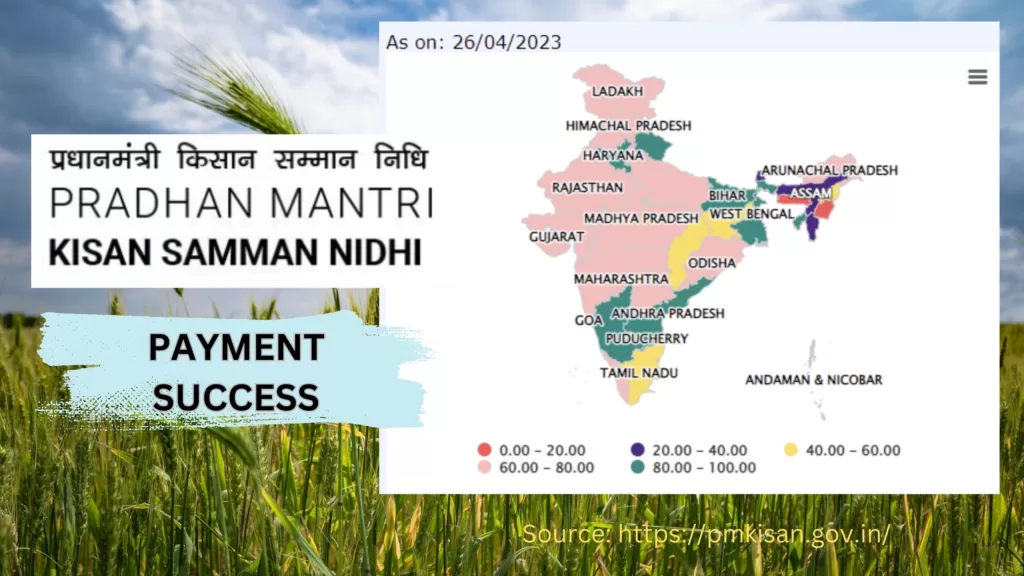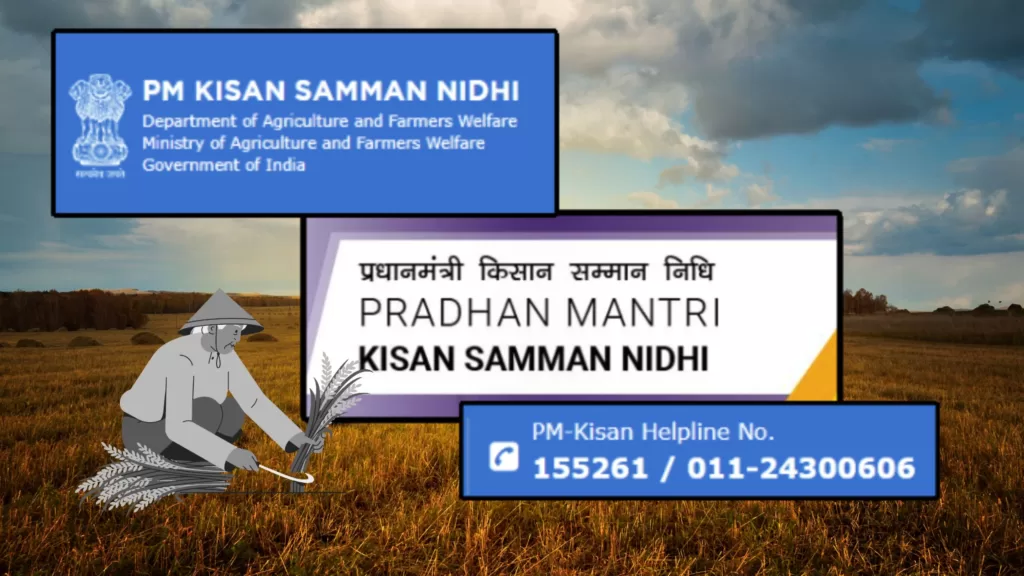Purpose of the Scheme– Pradhan Mantri Kisan Samman Nidhi:
The objective of this scheme is to provide financial assistance to families of landholding farmers to meet their agricultural requirements, ensuring the well-being of crops and achieving desirable yields. This is a central government scheme which is intended to align with the expected farm income and cater to the domestic needs of the farmers. To achieve this, the Central Government has implemented a scheme wherein an annual amount of Rs. 6000/- is disbursed directly into the eligible farmers’ bank accounts through the online platform, specifically via the Direct Benefit Transfer mode. However, it’s important to note that there are certain exclusions applicable to this scheme.
The primary aim of this scheme is to address the financial constraints faced by farmers and facilitate their access to essential agricultural inputs. By providing monetary support, the government intends to enhance crop health and productivity, thereby ensuring sustainable farming practices. The scheme recognizes the pivotal role played by farmers in the agricultural sector and seeks to empower them by assisting in meeting their financial requirements.
Through the Direct Benefit Transfer mode, the government aims to streamline the distribution process and eliminate intermediaries, ensuring that the financial assistance reaches the intended beneficiaries without any pilferage or delays. This mode also promotes transparency and accountability in the disbursement process, as the funds are directly transferred to the farmers’ bank accounts.
However, it’s important to note that certain exclusions exist within the scheme. These exclusions may vary and could be based on factors such as income levels, landholding size, and participation in other government welfare programs. These exclusions are designed to target the financial support to those farmers who genuinely require assistance and may help in optimizing the allocation of resources.
In short, this scheme endeavors to provide a timely and direct financial boost to farmers, enabling them to procure necessary inputs, enhance crop health, and achieve sustainable agricultural practices. By supplementing the financial needs of landholding farmers, the government aims to contribute to their overall well-being and promote agricultural growth in the country.

Benefits of Pradhan Mantri Kisan Samman Nidhi:
The scheme offers a range of benefits and has certain eligibility conditions in place. All farmer families who own land and meet the eligibility criteria can take advantage of the scheme. This decision was made by the cabinet in May 2019. With the revised scheme, it is anticipated that an additional 2 crore farmers will be included, resulting in a total coverage of approximately 14.5 crore beneficiaries under the PM-KISAN scheme.
The scheme primarily focuses on providing financial assistance to Small and Marginal landholder farmer families. These families are defined as those who own cultivable land up to 2 hectares. They are eligible to receive an annual benefit of Rs. 6000 per family. The payment is made in three equal installments, disbursed every four months.
By offering financial support to these farmer families, the scheme aims to address their specific needs and challenges. The funds provided can be utilized by the farmers to meet various requirements related to agriculture, ensuring the health and productivity of their crops. It enables them to purchase essential inputs such as seeds, fertilizers, pesticides, and other necessary resources, which contribute to better yields and improved agricultural practices.
The scheme’s approach of providing the financial benefit in installments throughout the year allows farmers to manage their expenses effectively and align them with the different stages of crop cultivation. This ensures a steady flow of support and enables farmers to plan their agricultural activities accordingly.
It is important to note that the eligibility conditions may include certain exclusion criteria. These exclusions are put in place to target the scheme towards those who genuinely require financial assistance. The specific criteria for exclusions may vary, but they generally take into account factors such as income levels, landholding size, and participation in other government welfare programs. This helps in optimizing the allocation of resources and ensures that the benefits reach the intended beneficiaries.
Overall, the scheme aims to provide direct financial aid to eligible farmer families, enabling them to meet their agricultural needs and achieve improved crop health and productivity. By supporting small and marginal landholders, the scheme contributes to the overall well-being of farmers and promotes sustainable agricultural practices.

Also Read: https://legalreferencer.in/legal-compliance-for-startups-in-india-guide/
Non-eligible members for the scheme-PM KISAN SAMMAN NIDHI:
The scheme does not extend benefits to certain categories of beneficiaries who fall under a higher economic status. These exclusions include:
- Institutional Landholders: Farmers who are categorized as institutional landholders are not eligible for the benefits provided by the scheme. This category typically refers to agricultural land owned by institutions such as universities, research centers, or government organizations.
- Farmer Families with Members in Specific Categories: The scheme also excludes farmer families in which one or more of its members belong to certain categories. These categories include:
- Former and present holders of constitutional posts: Individuals who have previously or currently held constitutional posts, such as high-ranking government officials or constitutional authorities, are not eligible for the scheme’s benefits.
- Former and present Ministers/ State Ministers and former/present Members of Lok Sabha/ Rajya Sabha/ State Legislative Assemblies/ State Legislative Councils: This category includes individuals who have served or are currently serving as ministers, state ministers, or members of various legislative bodies at the national or state level.
- Former and present Mayors of Municipal Corporations: Individuals who have previously or currently held the position of mayor in municipal corporations are excluded from receiving benefits under the scheme.
- Former and present Chairpersons of District Panchayats: This category encompasses individuals who have previously or currently held the position of chairperson in district panchayats.
- Serving or retired officers and employees of Central/ State Government Ministries/ Offices/ Departments and its field units: Individuals who are currently employed or retired from government ministries, offices, departments, and their field units at the central or state level are not eligible for the benefits provided by the scheme.
- Central or State Public Sector Enterprises (PSEs) and Attached Offices/ Autonomous Institutions under Government: Employees of central or state public sector enterprises, as well as attached offices and autonomous institutions under the government, are also excluded from receiving benefits under the scheme.
- Regular employees of Local Bodies (excluding Multi-Tasking Staff/ Class IV/ Group D employees): Regular employees of local bodies, such as municipalities or municipal corporations, are not eligible for the scheme’s benefits. However, employees in lower-ranking positions such as multi-tasking staff, Class IV, or Group D employees are not excluded.
- Superannuated/retired pensioners with a monthly pension of Rs. 10,000/- or more (excluding Multi-Tasking Staff/ Class IV/ Group D employees): Individuals who have retired and receive a monthly pension of Rs. 10,000/- or more are not eligible for the scheme’s benefits, except for those in lower-ranking positions as mentioned above.
- Individuals who paid income tax in the last assessment year: Beneficiaries who have paid income tax in the most recent assessment year are excluded from the scheme.
- Professionals like doctors, engineers, lawyers, chartered accountants, and architects registered with professional bodies and actively practicing their profession: Professionals who are registered with their respective professional bodies and are actively practicing as doctors, engineers, lawyers, chartered accountants, or architects are not eligible for the scheme’s benefits.
Advantage of a scheme-PM KISAN SAMMAN NIDHI:
The Pradhan Mantri Kisan Samman Nidhi provides a financial benefit of Rs. 6000 per year per family, which is disbursed in three equal installments of Rs. 2000 each. These installments are paid to the eligible beneficiaries every four months.
Also Read: MID DAY MEAL SCHEME- A DETAILED GUIDE

Who is eligible to take benefits of Pradhan Mantri Kisan Samman Nidhi:
The Pradhan Mantri Kisan Samman Nidhi scheme extends its benefits to landholding farmers’ families.
The eligibility for receiving benefits under the scheme requires the families to have cultivable land in their names.
Landholding farmers and their families qualify for the benefits provided by the Pradhan Mantri Kisan Samman Nidhi scheme.
The scheme aims to support farmers who own land suitable for cultivation.
Families with ownership of cultivable land are eligible to avail themselves of the benefits offered by the scheme.
The scheme is designed to assist landholding farmers and their families specifically.
Farmers who possess cultivable land under their ownership can access the benefits provided by the Pradhan Mantri Kisan Samman Nidhi scheme.
Landowning farmers and their respective families are eligible to receive benefits through the scheme.
The scheme targets landholding farmers’ families to ensure they receive the intended benefits.
Having cultivable land in their names makes farmers’ families eligible for the benefits provided by the Pradhan Mantri Kisan Samman Nidhi scheme.
How to apply for the scheme- Pradhan Mantri Kisan Samman Nidhi:
- Aadhaar Card: Possession of an Aadhaar Card is required as a mandatory document for the enrollment process.
- Landholding Paper: The landholding paper or document is necessary to establish proof of ownership or legal entitlement to the land.
- Saving Bank Account: An active saving bank account is required for the enrollment process. This bank account will be used for the direct transfer of financial benefits under the scheme.
- The Village Level Entrepreneur (VLE) is responsible for entering comprehensive information during the farmer registration process. This includes the details of the state, district, subdistrict block, and village where the farmer resides. The VLE will input the Aadhaar number, beneficiary’s name, category, bank details, Land Registration ID, and date of birth as printed on the Aadhaar card. These details are entered for the purpose of authentication and verification. The VLE ensures that accurate and complete information is recorded to facilitate the registration of farmers under the scheme.
- The Village Level Entrepreneur (VLE) is responsible for recording the land details during the registration process. This includes entering the Survey/Kahta number, Khasra number, and the area of land as mentioned in the land holding papers. The VLE ensures that the land details provided by the farmer are accurately documented for proper verification and inclusion in the registration process.
- When applying for the Pradhan Mantri Kisan Samman Nidhi scheme, it is required to upload supporting documents such as land documents, Aadhaar card, and bank passbook. These documents serve as evidence and verification of the applicant’s land ownership, identification, and bank account details. Uploading these supporting documents is an essential step in the application process to ensure the accuracy and legitimacy of the information provided.
- After accepting the self-declaration, the application form is saved. Once the application form is saved, the payment can be made using the CSC ID (Common Service Centre ID). The payment process is carried out through the designated CSC ID to complete the application submission. Saving the application form and making the payment through the CSC ID are the subsequent steps in finalizing the application for further processing.
- To check the beneficiary status, use the Aadhaar number for verification. By entering the Aadhaar number, you can verify and retrieve the status of the beneficiary. This process allows you to track and ascertain the current status of the beneficiary’s enrollment or participation in the scheme using their unique Aadhaar identification number.
Required Documents for Pradhan Mantri Kisan Samman Nidhi :
Under the Pradhan Mantri Kisan Samman Nidhi scheme, the following indicative documents are required:
- Aadhaar Card: A valid Aadhaar Card is necessary for the application process. It serves as a primary identification document for the beneficiary.
- Landholding Papers: Documents related to land ownership or landholding papers need to be submitted. These papers provide proof of the beneficiary’s ownership or entitlement to cultivable land.
- Savings Bank Account: An active savings bank account in the beneficiary’s name is essential. This account will be used for the direct transfer of financial benefits under the scheme.